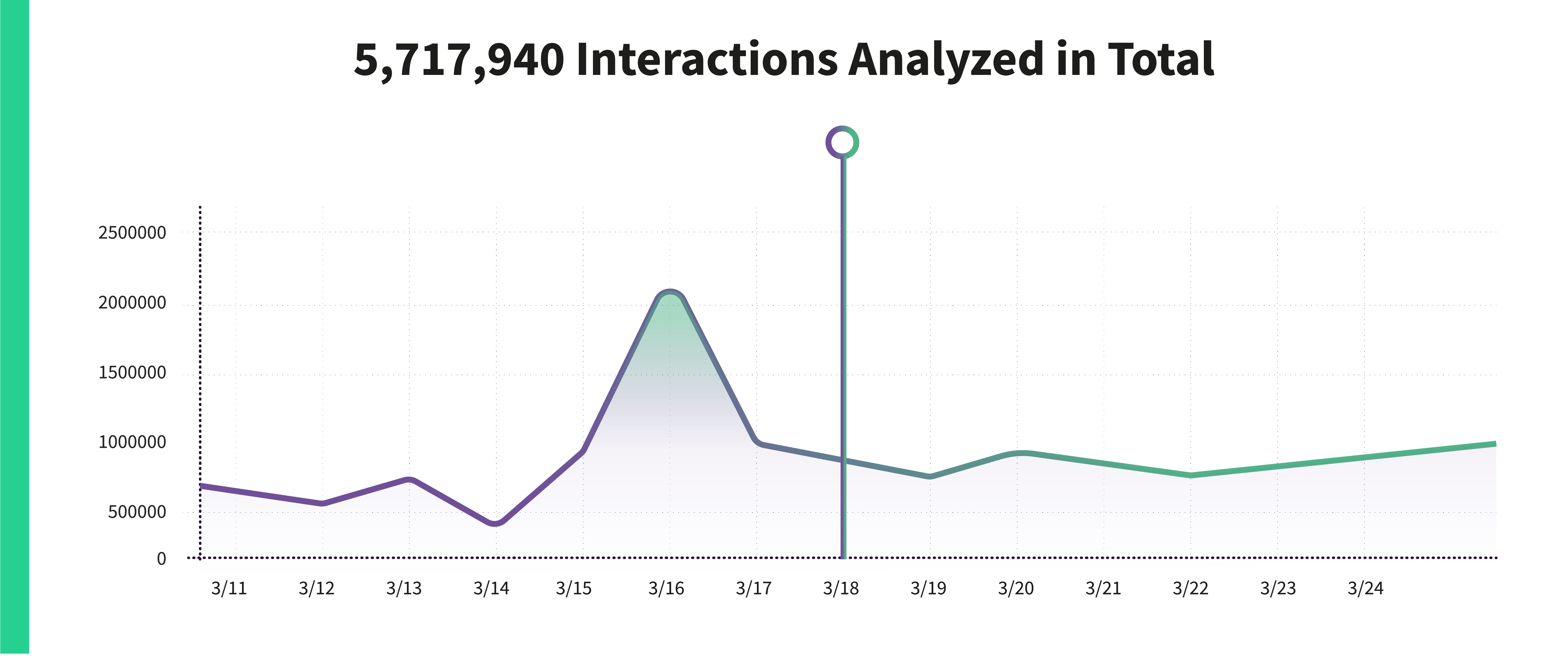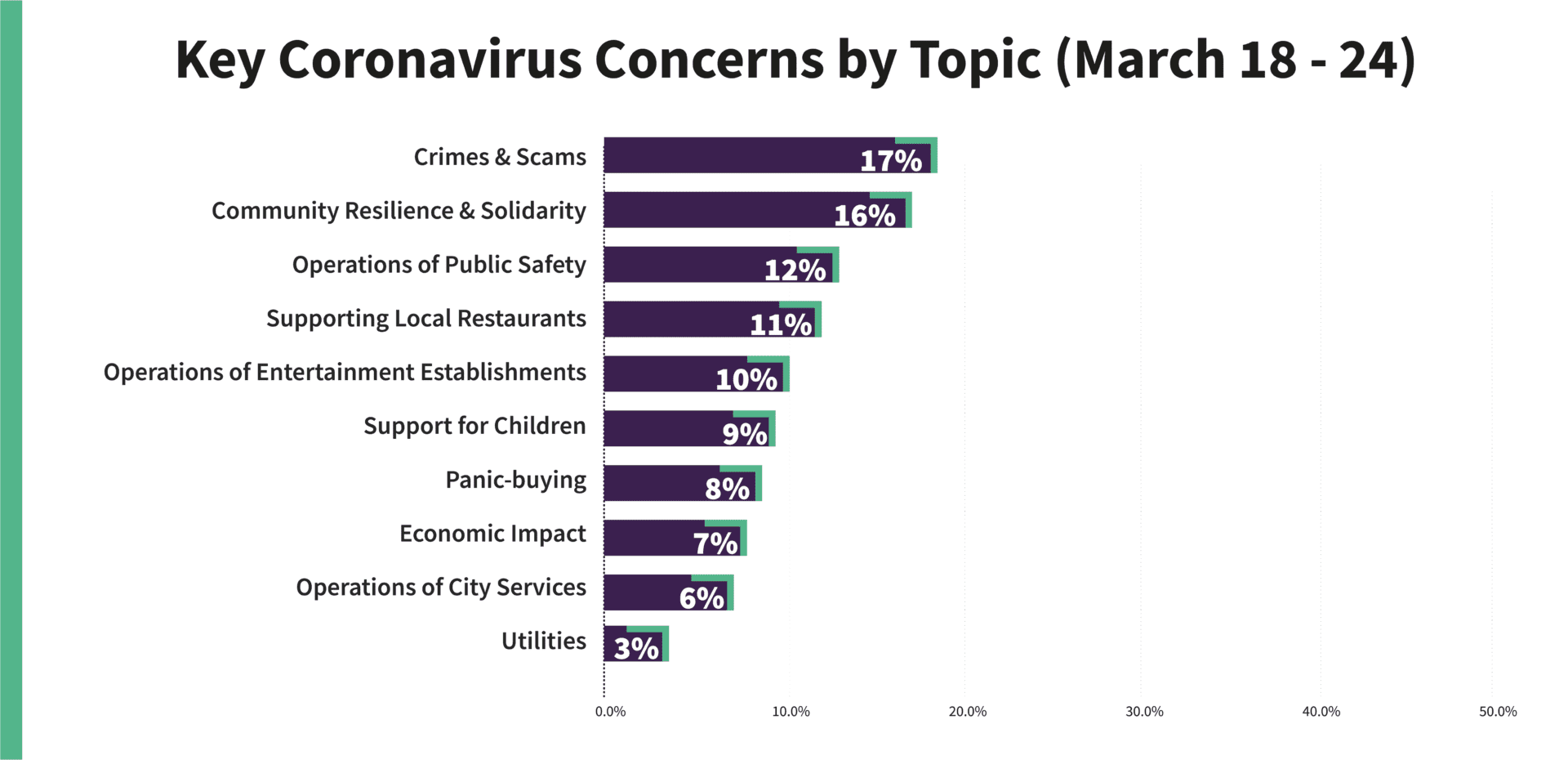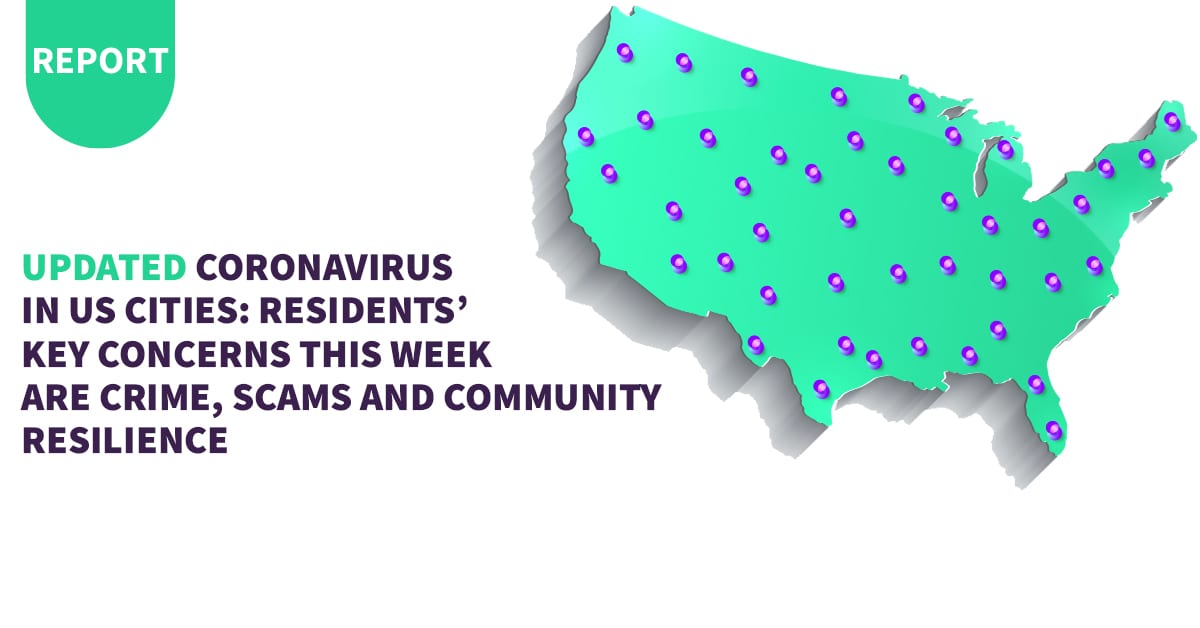COVID in US cities: Residents’ key concerns this week (March 2020)
.png)
Zencity
The Platform for Community Trust
As another week goes by, it seems like the world is starting to set into a new normal, a coronavirus normal. The coronavirus pandemic and resulting lockdowns, self-isolation, and school closures have meant that communities need to rapidly adjust to a new way of life. Now more than ever, the public is taking to the internet to share their concerns, needs and quarantine routines and we can look at those conversations to really understand – what’s on their mind.
Over the last couple of weeks we released reports which analyzed over 8M online data points from the first weeks of March. This analysis highlighted the key concerns of communities in over 100 cities across the US regarding COVID19.
Our goal with these reports was to aid local government teams- the men and women on the frontlines of the COVID-19 outbreak- to efficiently identify their community’s needs and better shape their crisis response, policies, and messaging.
But as the crisis continues to unfold, there is an acute need for updated, relevant data to support these big decisions. And that is why we’re sharing this new, updated version, analyzing 5.7M online interactions from this past week.
While in our previous report we found that residents were most concerned with operations of cultural/entertainment institutions (over 44% of the comments), this week’s data is more diversified, highlighting the fact that COVID-19 has now touched every facet of city life.
Specifically, we see the leading topics this week touch on the very fabric of society and of residents’ lives, both positively and negatively, making crime and scams (13%) and community resilience and solidarity (12%) take the lead.
Residents Key Coronavirus Concerns (March 18-24)

Before diving into the specific concerns of city residents, let’s take a quick look at how the discourse volume has changed since our previous analysis (March 11-17). After a peak in the discourse last week (specifically on March 16th), the discourse dropped and has remained consistent since. Overall, there was a 15% drop in discourse volume. We presume that this is in part due to the fact that residents have begun to adjust to the new normal amid the pandemic, causing a subsequent drop in online conversations.
Accordingly, let’s examine how residents’ key concerns/points of interest have diversified over this past week:

We see that contrary to past weeks, there is no singular issue that is dominating the conversation (such as cultural/entertainment establishments or school closures in past weeks). This indicates that many fundamental uncertainties/fears within a city have been addressed, such as whether schools will remain open, transmission anxieties, and cancelling of public events.
Rather, residents have shifted their focus to discuss adjustments to their routine, potential threats in their transformed day to day, and likely new, permanent changes that will be seen in their community.
The leading concerns tell a moving story of the fight to keep the fabric of society together. On the one hand, the leading category (Crime and Scams) shows the security challenges that this new situation brings. On the other hand, the elevated discussions about volunteering reinforces a sense of hope as communities across cities come together to support ones in need. No one knows exactly what will come, but we do know that society- government, healthcare, the economy, our lifestyles, and more- will change.
Below is a deeper examination of the new key concerns:
Crime and Scams
- In some cities, there have been reported cases of violence and abuse, mostly of children, assumed to be triggered by stress and quarantines. This has garnered substantial attention on online channels
- Alerts about scams, such as people trying to sell fake at-home testing kits for Coronavirus, are quickly circulating within communities
- There have been many reports of people stealing toilet paper from park restrooms and residents are actively commenting on these updates
- In California, some people have openly discussed the need to buy guns, while in parallel crimes/rumors of crimes related to the virus have increased (e.g. rumors of burglars disguising themselves as COVID-19 testers )
Community Resilience and Solidarity
- New community-run initiatives have sprung up across cities such as food donation, mask distribution, and fundraising/volunteer efforts for local businesses. These initiatives have gained a lot of sharing and positive feedback online.
- Many community members are discussing ways in which they can actively provide assistance to senior citizens and how some residents are already helping
Operations of Public Safety
- Many police departments are sharing online how they strive to enforce the “shelter at home” order
- Police departments are also utilizing their channels of communication to share information and/or direct people to the city’s official coronavirus information page. In parallel, we also see many people are turning to the police for answers about coronavirus
- Police and fire departments are frequently posting about their daily routine and showing how they practice social distancing
- Many residents are curious about how they should report noncompliance with city ordinances and what warrants calling 911
Supporting Local Restaurants
- Posts by cities and/or other local organizations which list open restaurants and encourage residents to support these businesses via ordering, have gained substantial traction within multiple cities.
- Many residents are discussing current restrictions on dining out and how to best move to deliveries. Some are also discussing the tougher regulations on takeaway food
- Popular campaigns that encourage ordering food, such as #Digitaldining have gained a noteworthy amount of attention from residents
Operations of Entertainment Establishments
- We see that residents still seeking to understand the operation status of entertainment/cultural establishments
Support for Children
- Many residents, especially parents, have taken to the internet to discuss online activities for kids. We also see city libraries and parks departments proactively sharing suggestions
- A lot of online conversations have been centered around the distribution of laptops for remote learning
- County communications teams, local organizations, and parents are actively discussing and getting the word out about creative solutions for providing meals to students
Panic-buying and social distancing at stores
- There are still reports and online chatter about panic-buying, mostly toilet paper. This discourse is often coupled with ongoing concerns about hoarding.
- Residents are also concerned with lines in grocery stores and how they fundamentally violate social distancing guidelines
Economic Impact
- Reports of price-gouging have caused residents to actively discuss the issue online
- Many residents are concerned with COVID-19’s economic impact. Updates from Chambers of Commerce in cities are gaining a lot of traction online as well as the promotion of shopping locally
Operation of City Services
- Residents are interested in updates from cities about services and how these services might be impacted during this time of crisis
- They were also particularly concerned with operations of services in light of city hall closures and expressed the need for clarification on how they would pay taxes/utilities/moratorium
Utilities
- Posts by city communications that assured residents that tap water is OK to drink gained a lot of traction online
- Many cities have proactively requested that residents do not flush wipes (in light of toilet paper shortages)
- Cities and residents are also actively discussing guidelines for waste management
As local governments need to shape new policies, support the vulnerable members of their communities, and constantly share information, we hope that these key concerns could help better inform teams on areas for prioritization. Take a look at our updated report that analyzes data from the 25th of March to the 31st.
Zencity also released a short one-pager describing main ways our 130+ partner network leverages the platform in light of the coronavirus crisis. Read more here:
%20copy-1.png?width=544&height=120&name=Logo_black%20(1)%20copy-1.png)



